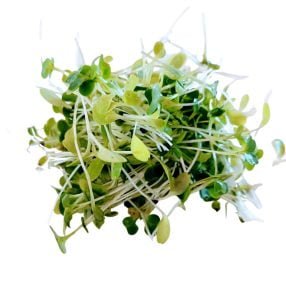Mesclun microgreens, small young plants harvested just before they are fully developed, are an excellent choice for those looking to increase their nutrient intake quickly and easily. Often used as decorative ingredients, these little greens offer various health benefits and are easy to incorporate into any meal.
Mesclun is a mixture of several small greens, including baby lettuces, mustard greens, arugula, and other green and red leafy vegetables. The variety of vegetables in mesclun means they provide a wide variety of highly bioavailable nutrients.
In this article, we will explore the benefits and nutritional contributions of mesclun microgreens.
Mesclun microgreens contain many health-promoting nutrients, including vitamins B, C, E, and K, iron, calcium, zinc, and magnesium. Some studies show that some varieties of microgreens can contain up to 40 times more nutrients than adult vegetables of the same species.
In addition to their high vitamin content, mesclun microgreens are also rich in antioxidants and phytochemical compounds, which provide unique properties. The main benefit of these microgreens is that the individual nutritional contributions are enhanced by being a mixture of several species.
Among the main benefits of mesclun microgreens are:
Improves heart health: mesclun microgreens are rich in antioxidant compounds, such as carotenoids and vitamin C, which may help reduce the risk of heart disease. According to research, the intake of mesclun microgreens can reduce LDL cholesterol levels, known as “bad” cholesterol, and improve artery function.
Boosts the immune system: mesclun microgreens are an excellent source of vitamins and minerals, including vitamin C, vitamin A, folate, and iron, which are essential for proper immune system function. In addition, antioxidants present in mesclun microgreens, such as carotenoids, are also known for strengthening the immune system.
Improves eye health: mesclun microgreens are an excellent source of carotenoids, such as lutein and zeaxanthin, which are known to protect the eyes from free radical damage and reduce the risk of age-related macular degeneration.
Prevents premature aging: Antioxidants, including those in mesclun microgreens, can protect the body from oxidative stress and prevent premature aging. A study examined the relationship between oxidative stress and aging and how antioxidants can prevent aging-related cell damage and degeneration. The results showed that oxidative stress can cause cellular damage and lead to several aging-related diseases, including cardiovascular disease, diabetes, neurodegenerative diseases, and cancer. In addition, it was found that antioxidants can reduce oxidative stress and prevent cell degeneration and aging. In particular, antioxidants such as vitamin C, vitamin E, beta-carotene and other carotenoids, and selenium were shown to have beneficial effects in preventing oxidative damage and cellular aging.
Improves gastrointestinal health: mesclun microgreens are fiber-rich and essential for gastrointestinal health. Fiber helps improve digestion, reduce intestinal inflammation, and prevent constipation. A study investigated the effects of incorporating mesclun fiber, derived from a mixture of different types of lettuce, with kale powder in a high-fiber diet based on whole grains and soybeans, on the intestinal health of mice. The results showed that the addition of mesclun fiber to the diet improved gut health by increasing the population of beneficial bacteria, reducing the population of disease-causing bacteria, and improving intestinal barrier function.
Overall, consuming mesclun microgreens can provide many health benefits, including improved cardiovascular, intestinal, and visual health, among others.
References
Johnson, E. J. (2014). Role of lutein and zeaxanthin in visual and cognitive function throughout the lifespan. Nutrition Reviews, 72(9), 605-612. https://doi.org/10.1111/nure.12133
Kritchevsky, S. B., Tell, G. S., Shimakawa, T., Dennis, B., Li, R., Kohlmeier, L., Steere, E., & Heiss, G. (1998). Provitamin A carotenoid intake and carotid artery plaques: the Atherosclerosis Risk in Communities Study. The American Journal of Clinical Nutrition, 68(3), 726-733. https://doi.org/10.1093/ajcn/68.3.726
Martínez-Ispizua, E., Calatayud, Á., Marsal, J. I., Cannata, C., Basile, F., Abdelkhalik, A., Soler, S., Valcárcel, J. V., & Martínez-Cuenca, M.-R. (2022). The nutritional quality potential of microgreens, baby leaves, and adult lettuce: An underexploited nutraceutical source. Foods (Basel, Switzerland), 11(3), 423. https://doi.org/10.3390/foods11030423
Slavin, J. (2013). Fiber and prebiotics: mechanisms and health benefits. Nutrients, 5(4), 1417-1435. https://doi.org/10.3390/nu5041417
Valko, M., Rhodes, C. J., Moncol, J., Izakovic, M., & Mazur, M. (2006). Free radicals, metals and antioxidants in oxidative stress-induced cancer. Chemico-Biological Interactions, 160(1), 1-40. https://doi.org/10.1016/j.cbi.2005.12.009
Xiao, Z., Lester, G. E., Luo, Y., & Wang, Q. (2012). Assessment of vitamin and carotenoid concentrations of emerging food products: edible microgreens. Journal of Agricultural and Food Chemistry, 60(31), 7644-7651. https://doi.org/10.1021/jf300459b
Disclaimer
The information provided in this article is for educational and informational purposes only and is not intended as medical advice. It is not a substitute for professional medical advice, diagnosis, or treatment. Always seek the advice of a qualified healthcare provider with any questions you may have regarding a medical condition. The author and publisher of this article are not responsible for any adverse effects or consequences resulting from the use of any suggestions, preparations, or procedures described in this article.






 Become a Reseller
Become a Reseller













